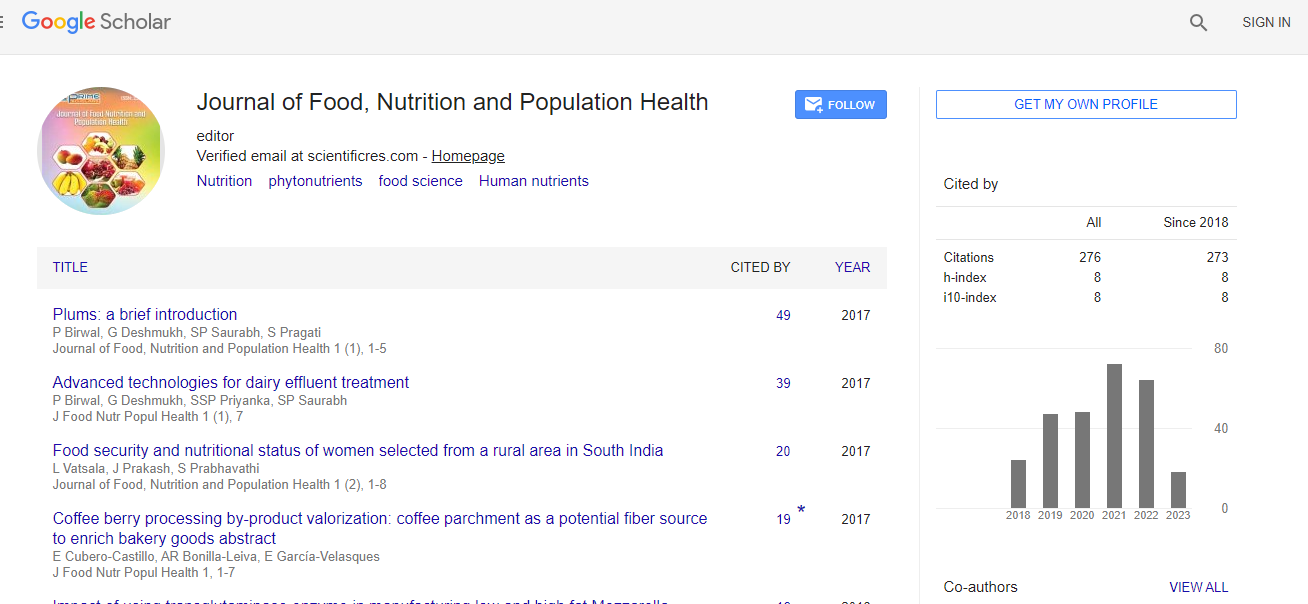Commentary - (2024) Volume 8, Issue 1
Exploring the Benefits and Disadvantages of Intermittent Fasting
James Ivy*
Department of Nutraceuticals, Quest University, Canada
*Correspondence:
James Ivy,
Department of Nutraceuticals, Quest University,
Canada,
Email:
Received: 28-Feb-2024, Manuscript No. IPJFNPH-24-19939;
Editor assigned: 01-Mar-2024, Pre QC No. IPJFNPH-24-19939 (PQ);
Reviewed: 15-Mar-2024, QC No. IPJFNPH-24-19939;
Revised: 20-Mar-2024, Manuscript No. IPJFNPH-24-19939 (R);
Published:
27-Mar-2024, DOI: 10.21767/2577-0586.8.01.10
Description
Intermittent fasting (IF) has gained popularity in recent years
as a dietary approach with potential health benefits. It involves
cycling between periods of fasting and eating, with various
fasting protocols available. While intermittent fasting has
been associated with several potential benefits, it also has its
drawbacks. This paper aims to explore both the benefits and
disadvantages of intermittent fasting to provide a balanced
understanding of this dietary strategy. Intermittent fasting can
facilitate weight loss and fat loss by reducing calorie intake
and increasing fat oxidation during fasting periods. Research
suggests that intermittent fasting may be as effective as traditional
calorie restriction for weight management and may
help preserve lean muscle mass. Intermittent fasting has been
shown to improve various markers of metabolic health, including
insulin sensitivity, blood sugar control, and lipid profiles.
Fasting periods can enhance glucose regulation, reduce insulin
resistance, and lower levels of inflammatory markers associated
with metabolic syndrome and type 2 diabetes. Fasting
triggers autophagy, a cellular process that removes damaged
components and promotes cellular repair and regeneration.
By inducing autophagy, intermittent fasting may help protect
against age-related diseases, neurodegenerative disorders, and
oxidative stress. Intermittent fasting may confer cardiovascular
benefits by reducing risk factors such as hypertension, high
cholesterol, and inflammation. Fasting periods can improve
heart health by lowering blood pressure, improving lipid profiles,
and reducing oxidative stress and inflammation in the
cardiovascular system. Some studies suggest that intermittent
fasting may enhance cognitive function, brain health, and neuroplasticity.
Fasting can stimulate the production of brain-derived
neurotrophic factor (BDNF), a protein that supports
neuronal growth, synaptic plasticity, and cognitive function.
Restricting food intake during fasting periods may lead to inadequate
intake of essential nutrients, vitamins, and minerals.
Prolonged fasting or inadequate dietary diversity can increase
the risk of nutrient deficiencies, particularly in micronutrients
such as iron, calcium, and vitamin B12. Intermittent fasting may
exacerbate or trigger disordered eating behaviors in susceptible
individuals, including binge eating, restrictive eating, and
obsessive thoughts about food and weight. Fasting protocols
that promote extreme restriction or unsustainable eating patterns
may contribute to negative psychological and emotional
outcomes. Intermittent fasting may exacerbate or trigger disordered
eating behaviors in susceptible individuals, including
binge eating, restrictive eating, and obsessive thoughts about
food and weight. Fasting protocols that promote extreme restriction
or unsustainable eating patterns may contribute to
negative psychological and emotional outcomes. Some individuals
may experience adverse effects during fasting periods,
such as hunger, fatigue, dizziness, headaches, or irritability.
These symptoms may be more pronounced during the initial
adjustment phase or with prolonged fasting durations and may
limit adherence to intermittent fasting protocols. Intermittent
fasting may not be suitable for everyone, particularly individuals
with certain medical conditions, metabolic disorders, or
nutritional needs. Pregnant or breastfeeding women, children,
adolescents, older adults, and individuals with a history of eating
disorders or medical complications should consult healthcare
professionals before attempting intermittent fasting. Intermittent
fasting offers several potential benefits for weight
management, metabolic health, cellular repair, cardiovascular
function, and cognitive function. However, it also has its drawbacks,
including potential nutrient deficiencies, risk of disordered
eating, disruption of social and lifestyle factors, adverse
effects, and suitability considerations. While intermittent fasting
may be effective for some individuals, it is not a one-sizefits-
all approach, and careful consideration should be given to
individual needs, preferences, and health status. Consulting
healthcare professionals and adopting a balanced approach to
fasting can help maximize the potential benefits of intermittent
fasting while minimizing potential risks and adverse effects.
Acknowledgement
None.
Conflict Of Interest
None.
Citation: Ivy J (2024) Exploring the Benefits and Disadvantages of Intermittent Fasting. J Food Nutr Popul Health. 8:10.
Copyright: © 2024 Ivy J. This is an open-access article distributed under the terms of the Creative Commons Attribution License,
which permits unrestricted use, distribution and reproduction in any medium, provided the original author and source are cred-
ited.

